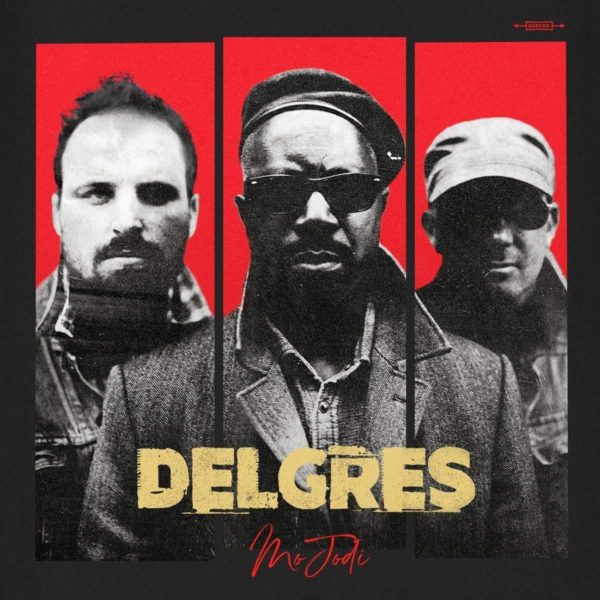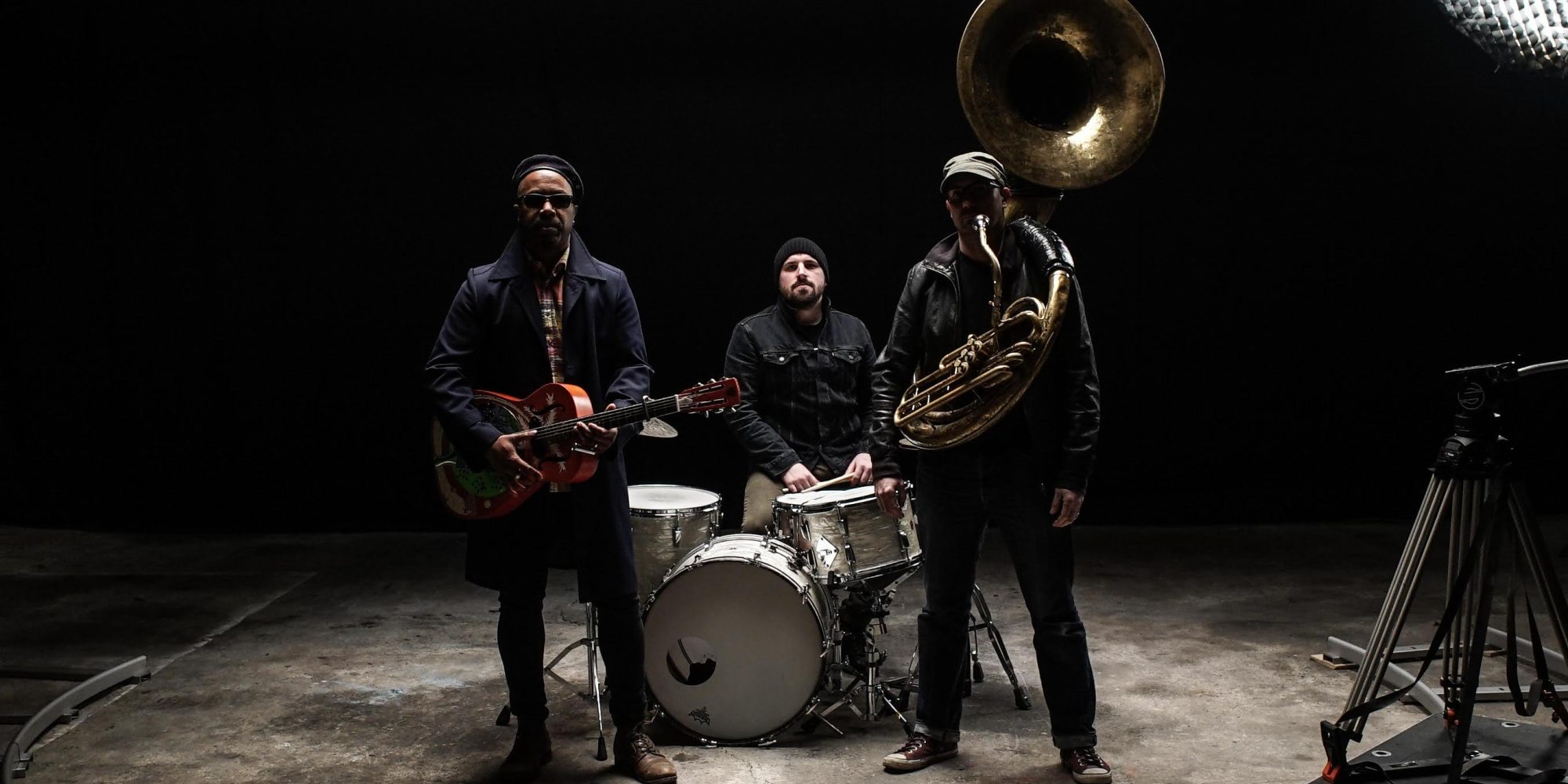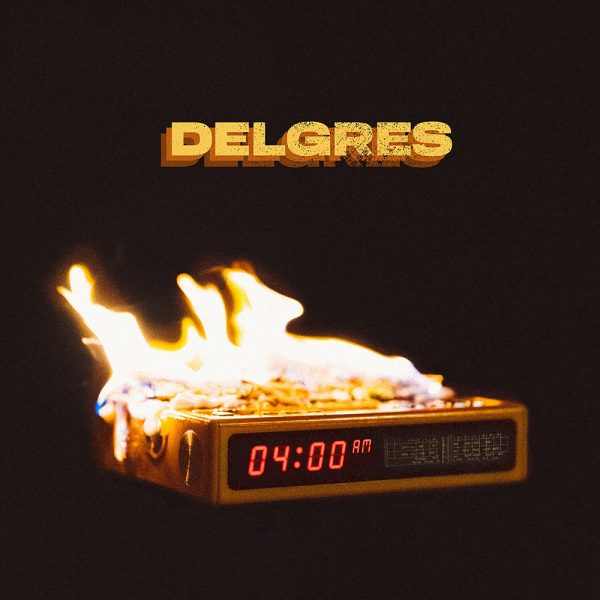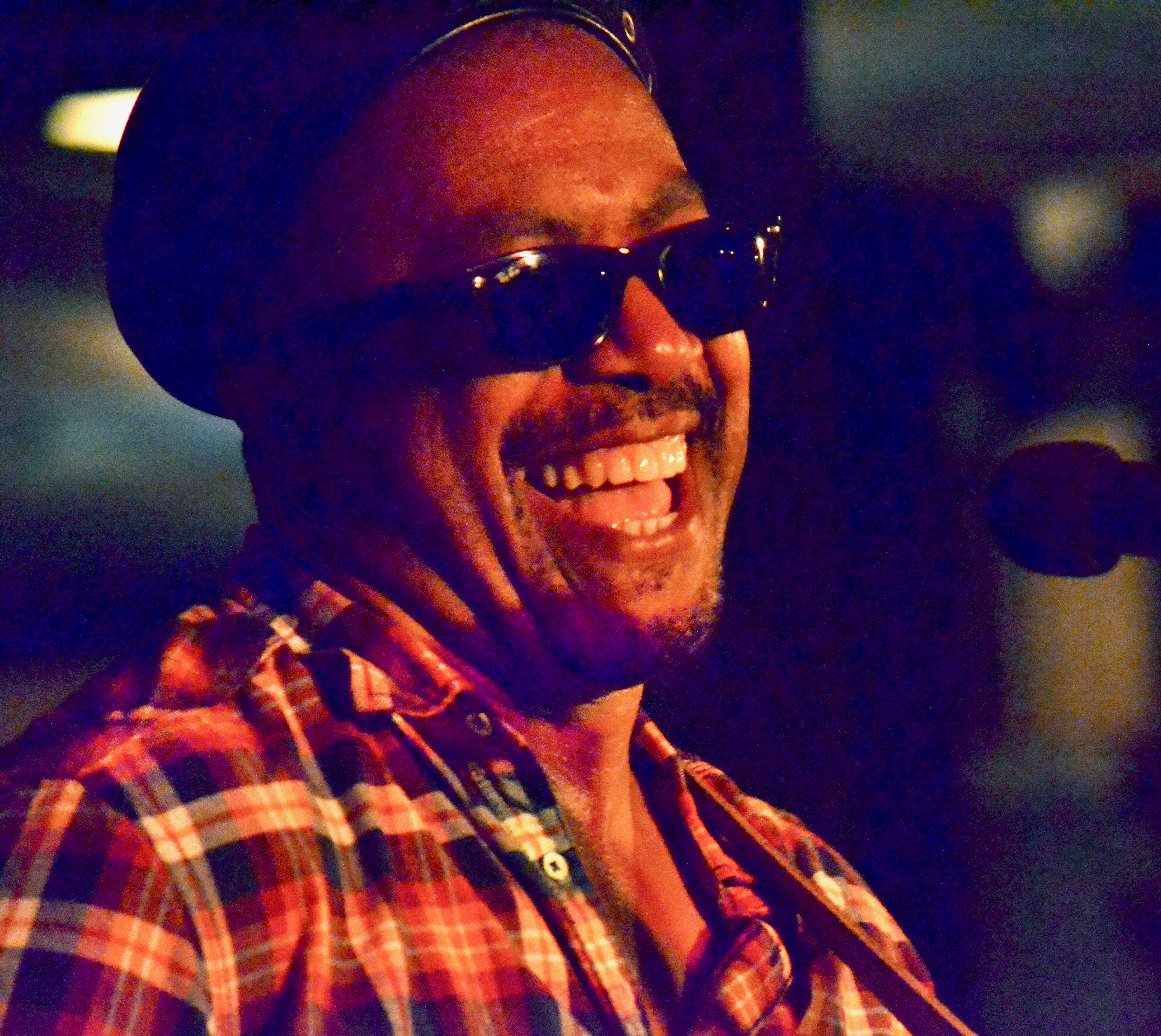Six years ago, way back in 2017, we were treated to a performance at the International Festival Nuits d’Afrique by an innovative trio that was exploring the connection between Afro-Caribbean and New Orleans music. That band was the France-based Delgres and they had just released their first EP of three songs. Led by former session guitarist Pascal Danaë, who previously had worked with the likes of Peter Gabriel and Harry Belafonte, the group also featured a drummer and – to secure the New Orleans connection – a tuba player.
Since we last spoke with Danaë, the band has released two full-length albums, Mo Jodi in 2018 and at 4:00AM in 2021, and are now finishing work on their third album to be released next year. They have also toured the world and developed quite a following. So before their show this year at Nuits d'Afrique, we sat down with them to chat about what's new.

We would suggest you read our earlier interview with Danaë from 2017 to get up to speed about Danaë's journey to discover his Guadeloupian roots and how that inspired him to create this band before joining us in this conversation.
(This conversation has been edited for length and clarity.)
Ron Deutsch: So it's been a while....
Pascal Danaë: Yes, it has. I think the first album was coming out.
So, I have one question. What's been going on with Delgres since we've had a chance to talk?
PD: Ha. Yes, well, since then, we have recorded two full albums. And right now, we are mastering the third album, which will be out in 2024. Otherwise, we've been touring a lot, basically. We've spent a lot of time touring, you know? Just having fun. Nothing major at all. You see, it's really where we come from – the live touring thing and having fun. So we've just kept on doing this. You may hear some sound changes if you listen to the second album. It's opening up a bit because there are other avenues we would like to explore, using synthesizers and old folk melodies. We want to explore and open out music to different areas.
Delgres – "Mo Jodi" (Live Studio Version)
So let's talk about that. For the first album, you had this idea of what this project was. It was just a little baby, unformed. And then you started to find out what it is. How did it open up if you think about going from the first to the second album? What did you learn about where it was going?
After a while, looking back, I found out that, for me, it was like therapy. You see what I mean? Because I was born in mainland France, with Guadeloupian roots, I escaped because I was born there, in France, away from my roots. You know the story, the fact that we called the band Delgres and all that. Through the writing of the songs and the lyrics, all the subjects were therapy for me to take it out of my chest. Always thinking about who I am exactly? Are you from Guadeloupe? Are you from Africa? Are you French? So we can put this together, and the music was more like – not wallpaper to it – but writing a story, and the whole canvas was the music, but it really was about writing.
Looking back at the first album, it really was a way of going back there, back to Guadeloupe, back in time, and also to someone who was able to fight physically against slavery and get back some dignity. So, on the second album, you have the story about my father, my parents, when they moved from Guadeloupe to the French mainland. So this is another story of migration, of resilience. So it's just a different space and time, but it's the same story – dignity. How do you manage to provide for your family? To keep your head up, you know, and be proud of who you are, and make the most of your life in a dignified way.
And I would like to say that on the third album – since we are traveling in time – first 1802, then 1960, and now, nowadays. So it's about me, us, all together now in this world that's going kind of crazy, as you know. Though it's not that bad, it's just a general feeling. Especially with COVID-19, all of a sudden, we were all in the same boat simultaneously. Because shit happens everywhere. And it's always the same, but for the first time – I mean one of the first times apart from a world war – we were all together in the same boat. And it gave everybody that sense of "Wow, anything could happen very quickly." Yeah, so this is us now. A new album, songs about today, and how, at the end of the day, whatever your roots were, wherever you come from, whatever happened to your family – whether it was wealthy, beautiful, poor, or terrible – then you have to deal with it and keep going. And the question is then, "How do we do that?'" That's the subject of the album.
It sounds like you're talking about questions of identity and healing. I've heard these words from musicians these last few weeks here in Montreal, both Nuits d'Afrique and at the Jazz Festival.
I don't know if music can heal because we've gone past that point where, you know… But music can help the healing process, depending on what you like, the kind of music, and what you're sensitive to. But now we get to a point where you have to do some even more profound work. It's not just about putting on that record and feeling better. You can go to a concert and feel the way people are together. And yes, maybe in a way that helps you. You go back home and feel you had that experience, which triggered something. Why not?
But I suspect that music now, especially when you listen to what's happening in the music, on the radio, you have a lot of things going on, but at the same time, for the mainstream, it's very narrow. So you like someone, want to discover new stuff or are curious and searching. Or, if you're not very careful, you take in all the commercial property, which is just a distraction. So, at the end of the day, if you want to heal, that would help the world get better. We need another kind of work, and it's much more profound, and it's more very, very personal and profound.
Delgres - “Aléas”
This connects to how you were using music and playing as a therapy, going inside yourself, healing within.
Yes. But it starts with oneself. With myself, for me.
Yeah. And that process is going well?
It's not too bad. [laughs] Because I figured it out afterward, I did it because I just needed to do it. And then, from the looking back, yes, awareness that something happened here. And so, from that point on, I started looking at it differently. It's like the odyssey of my family. Through my family, of course, it's also hundreds and millions of people, all in their own way, with their own family, with their roots. So it's like each and every person – how do you deal with all this? And that leads you to another kind of affection. So yeah, okay, music can help. For some people, it may be writing, painting, whatever sports, but this is the kind of work we need to do, we have to do, to get through this thing and to make it better, not just to repeat the same mistakes. It might be a route to avoid all the violent stuff… if we do the work. It's a vast program.
Yeah. And in terms of identity... You've been learning about yourself. But what about the audiences? What about the people coming to see you? How, if you get to interact with some of the audience members, people who are starting to follow your band, people who are playing it on the radio, all these things. Do you have any sense of how the music is affecting them, reaching and touching them, and getting them to think about the things you've been thinking about, getting to the dignity you're finding within yourself? How do you think the music reaches people and offers them some of that for themselves?
The people who are sensitive and are touched by our music either have been through the process or are at the beginning of opening up. Some people won't bother because they are on a different route and need something else. But of course, most people we've met, that we've touched, they are like, "Wow, okay." Sometimes, they have an idea of something when they listen to music. They have a picture of a society that could have been more cohesive. See what I mean? And sometimes, when they listen to music, they say, "Ah, this is it. This is what's up. This is what I had in mind. Because it's right in front of me now." You have that guy singing Creole and some rock stuff, and you have these guys from France all together doing it. So now it's real. So they see a version of something they had in their mind already. I'd like to know if I explained that well.
Yes. Just hearing the music and seeing you guys confirms an idea they had in their head that maybe there's another way to look at the world.
Exactly.
Is there anything that stands out that turned that switch for you? Maybe a place you were, a gig in your journey. Is there anything that stands out that was really special and magical? You can answer that any way you want.
We have so many times when we had such a great time. Some moments where it's really happening, in communion with the audience, and we feel, wow, this is where we have to be; this is where we belong. We have many times like this.
But the way I look at it and appreciate what we have and what we've built so far, for me, it's been through my personal life. My daughter, I'm a grandfather now. And so you see all the cycle of life. You see it; the older you grow, the older you become. We hope so, yeah? And then you start appreciating the fact that we're still here.
And the group? We're different, but we complement each other. And this is a human experience. We only spend a little bit of time actually rehearsing. We play a little bit, and then we stop and we talk. We talk a lot about what we must do sometimes, or sometimes, we have a beer and go back to play. To me, it's just a tremendous human journey. And also, we have so much that we want to explore. We're talking about recording an acoustic album because we love folk music, something with a pedal steel guitar, and having something like a really natural sound in the room. And then, the next minute, I might use a lot of synthesizers, organic things, or an instrumental album. Because we listen to all kinds of music and you want to express your feelings in different genres, having people travel with you.
In terms of doing some folk things, will there be projects of Delgres or something outside?
Yes, because we keep talking about it as going to be Delgres. It could even be songs we've already recorded but record them differently.
When you say folk songs, we're talking about folk music? American or French…?
You know me, I'm always going to be of an African soul, a Caribbean soul, but a little bit different. But here, we love acoustic guitars, strings, mandolins. They're similar. A little pedal steel guitar. I love that. It's like a force. It's beautiful. Of course, Daniel Lanois is my hero.
Delgres - “Vivre sur la route” - Live @ Le Pont des Artistes
Yeah, very cool. But for now, on this new album...
There's more French in it because this is about me living in France. So we have a mixture of French Creole. And yeah, it sounds more now. It's less earthy. Really, when you go from the first album to the last album, the feeling I had is like you going from the swamp, and then you open up the sound, and you come to the city – you come to Montreal, to New York City. That's the feeling of traveling.
Is there a particular song on the new album that you're excited about and want to tell me about, or do you want me to wait for the album to hear it?
We especially love this song, "Promis le ciel," "We were promised heaven." It will probably be the first single off the album. The song is in French, and it's a story about a kid in Africa who wakes up in the middle of the night, and then you have the guys who come pick him up and take him away. I keep saying in the song how they brought us the cross, then took us away, put us in a boat, the boat as sailing, we couldn't stand, we couldn't lie down, or do anything, but it's okay because they were taking us to America. The promised heaven. So, I always do a parallel. So, at the same time, you have that image of religion, people that come with a very high principle, but at the same time, they do terrible things. So when I say we were promised heaven, it's like today. We have a lot of people talking about promises, people with very high principles; they get together and talk about the planet, how we have to save the earth, and all that, and yet the business goes on underneath. It's the same people and the contradiction between how people talk about principles. It all depends on their actions. And if they walk the same as they talk, you know?
But eventually, it's going to be through personal work, individuals working on themselves, not always seeking the answer outside. And it's a long, long journey. There's no way around it. We're facing the wall.
It's trying to set a direction to get people to think about where we are and what they need to think and do to help make the world a better place. Not to be grandiose about it.
[laughs]
But Delgres is also fun to dance and have a good time.
Absolutely. That's the main thing, and I always keep saying… that when you see Delgres, you can have a good time doing this. Don't worry. Even if you don't understand a word, it's okay. And if you do understand the words, you can have a good time, but it will also make you think. Maybe it's going to trigger something. To give you that small idea that you will be going home and thinking about it. I don't know, but that's what we do. We're witnessing you.
Delgres – “4 Ed Maten”
Well, you've got to get ready for the show. Great to see you again.
And you. We'll be in touch when the new album comes out.
Related Articles












